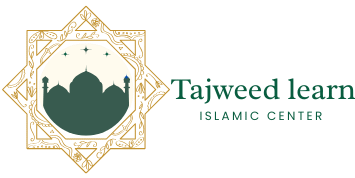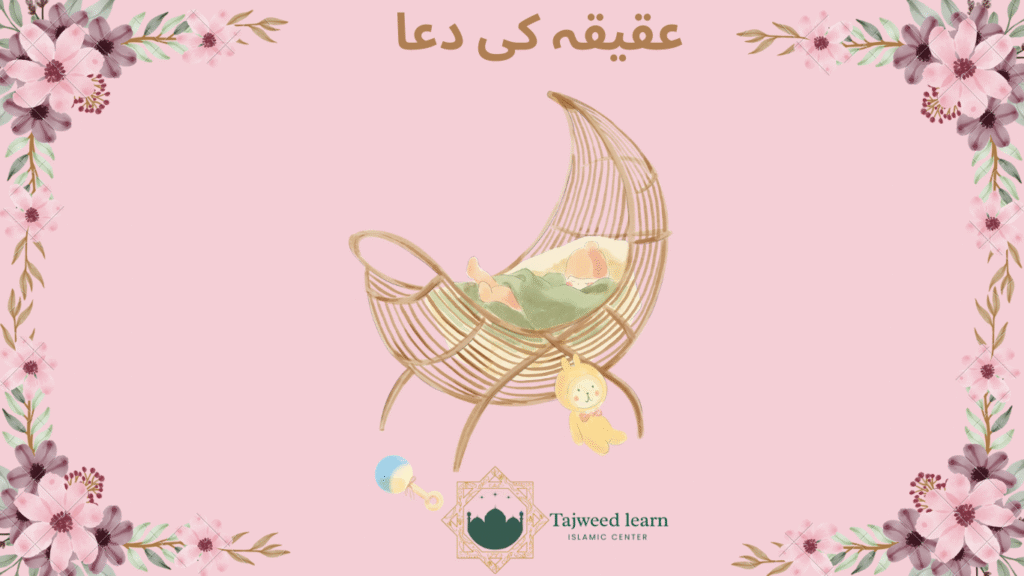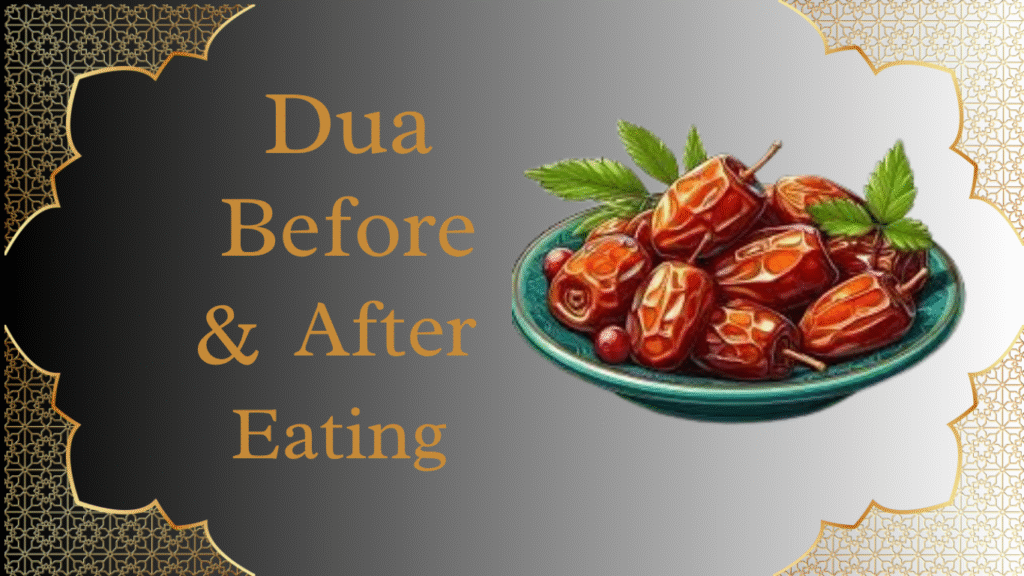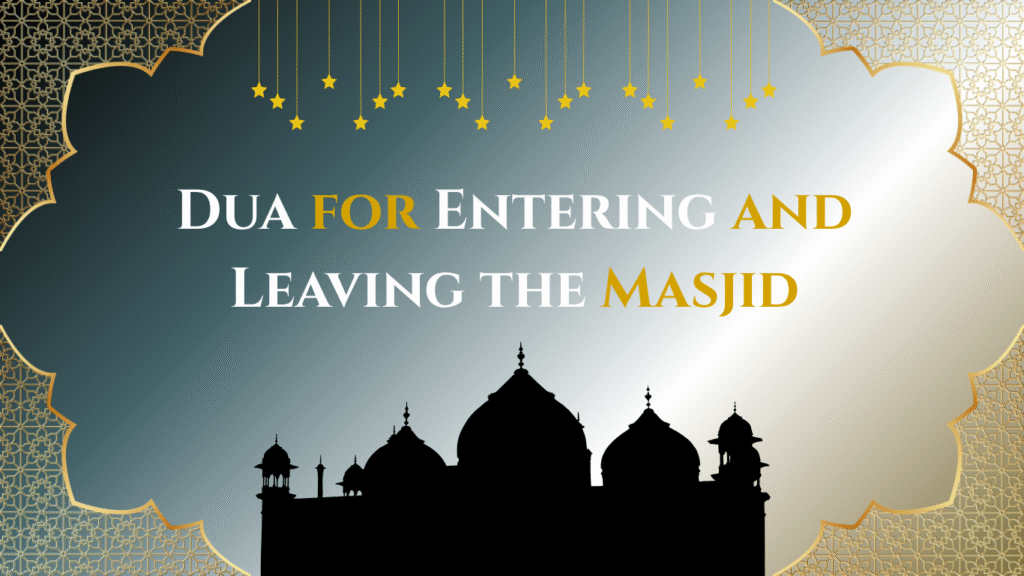What is Aqiqah?
Aqiqah is a Sunnah ritual performed by Muslims when a child is born, as a way of showing gratitude to Allah for His blessings and celebrating new life. It involves the sacrifice of an animal.
And the distribution of meat to family, friends, and disadvantaged people. This act reflects love, unity, and the spiritual beauty of birth in Islam.
Read More : Ayat e Karima
Meaning of Aqiqah:
- The word Aqiqah literally means “cutting” or “shearing” — referring to the cutting of the animal’s throat as a sacrifice.
- It is also linked to cutting the hair of the newborn child, which is usually done on the seventh day after birth.
- The act symbolizes gratitude, charity, and dedication to Allah.
- It is recommended to perform Aqiqah on the 7th day of the baby’s life, but it can be done later if necessary.
🌙Aqiqah Dua for a Boy And Girl:
Aqiqah Dua for a Boy
Arabic (عربی):
English Translation:
Transliteration:
Urdu (اردو):
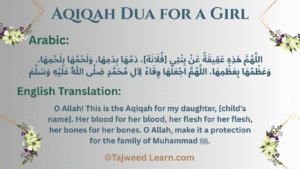
Aqiqah Dua for a Girl
The dua remains exactly the same, just change the word “وَلَدِي” (waladī) meaning “my son” to “بِنْتِي” (bintī) meaning “my daughter”.
Arabic (عربی):
English Translation:
Transliteration:
Read More : Dua After Salah
Urdu (اردو):

Spiritual And Social Benefits of Aqiqah:
Spiritual Benefits
- Thankfulness to Allah:
Aqiqah is a way to express gratitude to Allah for the blessing of a child.
- Following the Sunnah:
It is a prophetic tradition (Sunnah) practiced by Prophet Muhammad (PBUH), so performing Aqiqah earns spiritual reward.
- Protection for the Child:
It is believed that Aqiqah serves as a means of protection for the newborn against harm or evil.
- Forgiveness of Sins:
Some Islamic scholars hold that Aqiqah can be a means to seek forgiveness and blessings for the child and family.
Social Benefits
- Community Bonding: Sharing the meat of the sacrificed animal with family, neighbors, and the poor strengthens social ties.
- Charity and Generosity: Distributing the meat to those in need is a form of charity and helps in social welfare.
- Celebration of Life: It is a way to joyfully welcome the new member of the family within the community.
Read More: Iman e Mufassal & Mujmal
Rules of Aqiqah:
Aqiqah is a recommended Sunnah performed to thank Allah for the gift of a newborn child. It is ideally done on the seventh day after birth but can be done later if needed. One animal is sacrificed for a single child, while twins require two animals.
The meat is divided into three parts: for the family, friends, and the poor. It is also customary to name the child and shave their head on the day of Aqiqah. The practice symbolizes gratitude, charity, and spiritual protection for the child.
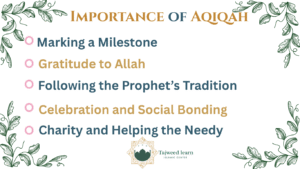
Importance of Aqiqah:
- Gratitude to Allah
Aqiqah is a way for parents to thank Allah for the blessing of a newborn child. It reflects gratitude and acknowledgment of Allah’s mercy and favor.
- Following the Prophet’s Tradition
The practice of Aqiqah was established by the Prophet Muhammad (peace be upon him), who recommended it as a Sunnah. Observing it helps Muslims follow his example.
- Celebration and Social Bonding
It provides an occasion to celebrate the arrival of a new life, bringing family and community together, strengthening social ties.
- Charity and Helping the Needy
The meat from the sacrificed animal is distributed among family, friends, and the poor, promoting generosity and support for those in need. - Marking a Milestone
Often performed on the 7th day after birth (though it can be done later), Aqiqah is associated with the naming ceremony and introduces the child into the community.
Read More : Istikhara ki Dua
Summary:
Aqiqah is an important Islamic tradition performed to celebrate the birth of a child and to thank Allah for this blessing. It usually involves sacrificing a healthy animal, typically on the seventh day after birth, though it can be done later if necessary. One animal is sacrificed for a single child, and two for twins.
The meat is divided among family, friends, and those in need, promoting charity and community support. Alongside the sacrifice, it is customary to name the child and shave their head, with the weight of the hair often given in charity.
Aqiqah follows the example of the Prophet Muhammad (peace be upon him) and is believed to bring blessings and protection to the child. While highly recommended, it is not obligatory. Overall, Aqiqah is a way to express gratitude, seek blessings, and strengthen social bonds.
